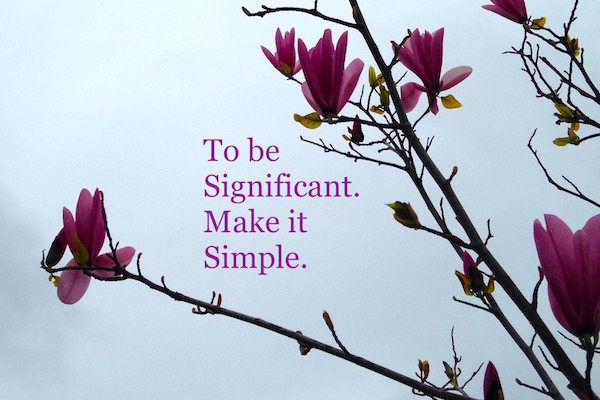Have you ever tried to corral a group of friends and come up with a plan. What do we want for lunch? What movie do you want to see? Should we go camping for the long weekend? It could be anything but when you get 5 or 6 friends together it gets tough to make a decision on something simple. Imagine something hard:
“Hey friends, want to start a successful business together? “
Getting all your friends on the same page is not easy, add something as complicated as a new business and finding a way to agree just got a whole lot worse! That is why I think it is naïve and maybe even unhelpful when I hear people ask ‘why aren’t these poor people collecting together and collaborating to make their lives better’

“It’s naïve to say poor people should just collect together to make their lives better”
Liz is a woman I trained who is volunteering in Zambia. Energetic and adventurous only begins to describe this retired Dutch-direct woman. She started her work with a child program for a year and went back for a second year to continue with a group of 5-6 widows and single mothers. Her agenda was simple – Connections and support for the women. They would cook together and chat over a meal, sharing laughter and tears at the table.
As Liz walked deeper into the stories of her friends she saw the everyday hard decisions of poverty. She wanted to step in and lend a hand. She talked to the group and suggested that maybe they should start a business together. Liz had her retirement income and she thought she could swing a small loan.
Noble intentions.
When she told me the news I felt really uneasy. I have seen this kind of well-intentioned solution way too often. It usually ends in pain – for the donor and the recipients.
“Want to REALLY help? Give up on the romance that the #poor are waiting to hear your great idea.”
The idea is out there that no one in the village has thought of working together before and they need a visitor to arrive with plans for them to happily share a business together. This way of thinking romanticizes people. The local culture may certainly be a lot more collaborative than yours, but it sure doesn’t mean that they are all going into business together. Do you have the free time to find a group of five friends and start a new business? Think of how tough that would be.
- What business do we start?
- What do we need to buy?
- Who is in charge?
- Who does what?
- How much do we chip in?
- When can you work?
- What’s fair?
- Who bankrolls this?
- Where will the profits go?
And another 1000 practical questions
Getting into business with friends is a recipe for complication.
I wanted to warn Liz about these questions, but since I was travelling all I had time for was to send her a strong email, written directly to her, asking her to hold on! I gave her some rushed quick points and asked if we could meet soon.
Liz told me that she read my email and suddenly saw the trouble she was getting into. She certainly didn’t want this project to end up totally dependent on the outsider. She wanted to change her plans but felt bad that she had already promised money. As a woman of strong faith she prayed and decided to lay her cards on the table.
She did something awful.
Liz opened up my email to her and read it to the group. When she told me this I felt terrible. I hadn’t known she was going to read my email out loud. I certainly would have written it differently if I knew I was directly communicating with her friends.
When Liz and I later talked, Liz laughed. She told me that my fears were unfounded. The meeting went really well. The women even told Liz that they had wanted to talk to her about the same questions that I had raised but they didn’t want to offend her. They liked her too much.
In the end Liz read my suggestion that the women start a savings group together. The women discussed and agreed. Each of them decided to pitch in a little each week, and at the end of the month one woman would get the cash, enough to fund a personal project.
Then Liz did something great!
Liz asked them to consider how much they could save each week and did something really helpful. She didn’t suggest an amount. The next time they met Liz discovered the women were saving double what she had assumed they could. They drew names and at the end of a month, Brendah received the group savings of $200. She immediately put it into buying more handbags to sell at her stall in the local market. No committee meetings. No profit-sharing. Just a hard-working woman who is building her business.
Every month, another woman receives her group savings cash and expands her own business. Some women are fixing their homes and shops, others are buying more stock to sell, others pay school fees and build up their sewing businesses. Community collaboration is vital for development. Unless it is the wrong kind (lead by an outsider)
Our solutions are easy – we think about them every day. Sustainability is hard. To be successful we must restrain ourselves. Maybe as outsiders we need “to not be the change we want to see in the community”
Did this post influence you? If so, tell me why in the comments below.
Mark Crocker
——————————————————–
PS. This is the email I wrote to Liz, unedited.
hi Liz,
- i would encourage you NOT to be the one who holds the money and gives the loan. Instead, I would do the training and ask if they would like to do a program like this. the unspoken thought if you hold the money is that a foreigner needs to be involved to really make this work. Good, sustainable development puts this back in the hands of the local people each and every time.
- secondly, I would suggest it is very important that the project is owned by an individual, not the group. If a group owns it, the group will commonly consider the project somewhat outside of themselves. failure and success are not as important to a group as blame for the failure can be put on something outside of oneself. the worst possible outcome would for the project to be seen as your project. This is what we see with projects all over Africa … “That is Unicefs well..”, “That is ERDOs chicken farm…” for a project to be successful, it must be owned locally.
- Do not start them out. Let the group build up savings together in order to build trust and anticipation – and most importantly long range project planning where there is a real risk for failure and lost money. Even a failed project that is owned localy is good for a person, as they tend to be a lot more cautious with how they plan for the next opportunity. If failure is not a very real option, in such a way that it will affect the people personally, the project probably does not have local ownership.
- Finally – realize that your suggestions are not suggestions. As the richest person in the room, they are heard with Biblical weight. IF Donald Trump ‘suggested‘ a business opportunity to you, you would probably pay very close attention and ignore your other plans, because you know that he is very financially successful. You are the Donald Trump to these women!
I am gone to Japan and Philippines for a few weeks, perhaps we can find a moment to chat after?
Mark Crocker

